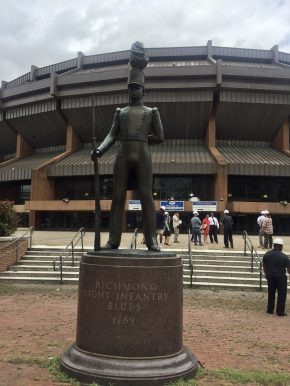Kristen Cavallo, CEO of Richmond-based ad firm The Martin Agency, has been promoted to global CEO of MullenLowe Group and will serve in both positions, Interpublic Group (IPG) announced Thursday.
IPG is one of the “Big Four” advertising companies, having started in 1930 as McCann-Erickson. Today, it includes dozens of companies, including MullenLowe, Octagon and McCann, as well as controlling interest in several independent agencies, including The Martin Agency. Cavallo, who became Martin’s CEO in 2017 and previously served as MullenLowe U.S.’s president and chief strategy and growth officer, will now lead 20 offices worldwide in 13 countries in her new role. She will still be based in Richmond, a Martin spokesperson said, but she will travel abroad often.
During Cavallo’s tenure as Martin CEO, the agency — known for its ad campaigns for clients such as Geico, Old Navy, UPS and Walmart — won Adweek’s Agency of the Year award twice in 2020 and 2021. She was named Ad Age’s Executive of the Year in 2019.
“Mullen is where I fell in love with advertising,” Cavallo said in a statement. “And my career’s biggest risks and deepest rewards happened at Martin. I’m so excited about this opportunity to work with them both, because I get to do work I love with people I love.”

Her promotion comes as Alex Leikikh, chairman of MullenLowe Group, has been named executive vice president of IPG. Cavallo will continue to report to him in her new role as global CEO. Cavallo’s ad career started at Mullen in 1994, when it was a Massachusetts-based firm with one office, and in 1998, she moved to Martin, becoming its director of business development before returning to Mullen in 2011 as its chief strategy officer.
“Kristen is the ideal person to build on what our teams have achieved at MullenLowe,” IPG CEO Philippe Krakowsky said. “The agency is consistently recognized for being among the top-performing networks for effectiveness and creative return on investment for our clients. Kristen’s experience, leading creative organizations to heightened levels of success and growth, will be a great asset for all of MullenLowe’s partners.
“She’s a leader that people want to follow, and she’s proven that she can attract and grow the industry’s best talent. That’s essential, given the speed at which marketing is evolving and the need all businesses have for leaders who can bring together diverse teams with a range of skills and expertise. Having known Kristen for many years, I’m confident that the more expansive the stage we provide for her, the greater her positive impact can be.”




